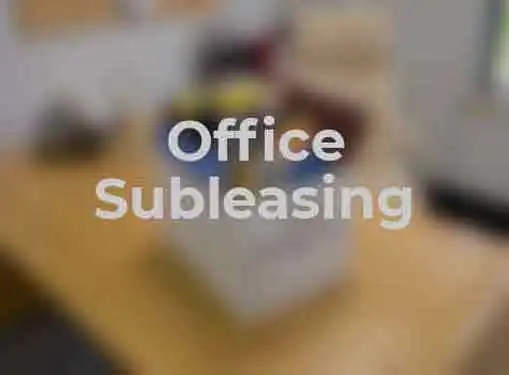Real Estate Decisions
Office Subleasing
Office subleasing is a great way to find good office space at an affordable price. We discuss the benefits and disadvantages of office subleasing.
Like so many things in small business, subleasing can be either your best friend or your worst nightmare.

The right office sublease can enable your business to inhabit top-shelf digs, while a bad one can leave you hanging high and dry. The difference often lies in your ability to weigh the pros and cons of a subleasing agreement before you sign on the dotted line.
The Pros of Office Subleasing
Flexibility is the big benefit of office subleasing. Let's say your company is bursting at the seams and ready to make the leap to larger space. The only problem is that your lease doesn't expire for another year and you can't afford to pay rent on two locations. By subleasing your current space, you gain the flexibility to move into a bigger space, right now.
However, subleasing can also offer flexibility to your business in some less obvious ways. For example, suppose you want to relocate your business to a district that is just out of your price range. It's possible to lease more space than you need (thus lowering the price) and sublet the extra square footage.
On the other hand, if your business is still small you may be able to benefit from the other end of the arrangement by leasing a few rooms from an over-spaced tenant in a high rent district.
Another perk of office subleasing is that it creates opportunities to share expenses, especially if you find yourself subleasing space from a much larger corporation. It's not unusual for subleasing tenants to nail down contract benefits like access to phone and internet connections, furniture usage, and other freebies.
The Cons of Office Subleasing
Before you fool yourself into thinking that subleasing only has an upside, you need to consider the potential pitfalls involved with subleasing.
For starters, subleasing is not necessarily for the risk-averse. Since your relationship is not directly with the landlord, your fate is tied to the fate of the primary tenant. If the primary tenant defaults on the lease for any reason, you will likely be evicted through no fault of your own.
Likewise, when the primary tenants lease expires, it may be difficult to gain an advantage in obtaining your own lease unless you have developed a relationship with the landlord.
One more factor to consider is that it's not unusual for large primary tenants to reclaim subleased space if they require additional space for their own purposes. To avoid getting burned, it's important to address the topic during the negotiation process and have a contingency plan should the need arise to procure new space in a hurry.
Risk-management is the key to effective subleasing. Although you can never completely insulate yourself from risk, you can minimize it by gathering as much information as you need to make an informed decision. If the benefits of the sublease outweigh the risks, your search is over.
But if the conditions of the sublease lead to an uncomfortable level of risk, don't hesitate to pass - no matter how prime the real estate may seem.
Share this article
Additional Resources for Entrepreneurs



Conversation Board
We greatly appreciate any advice you can provide on this topic. Please contribute your insights on this topic so others can benefit.